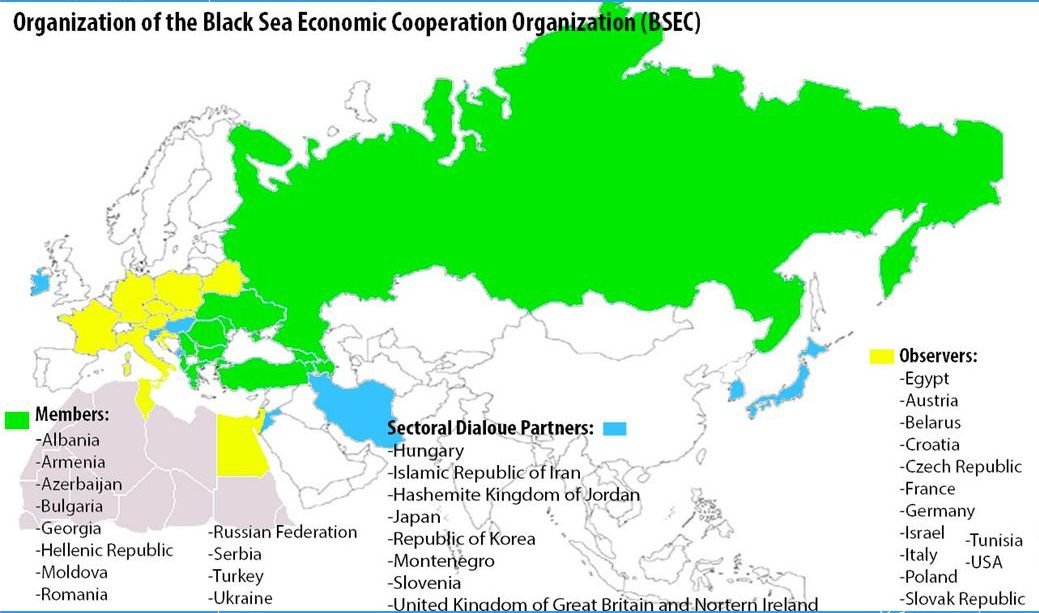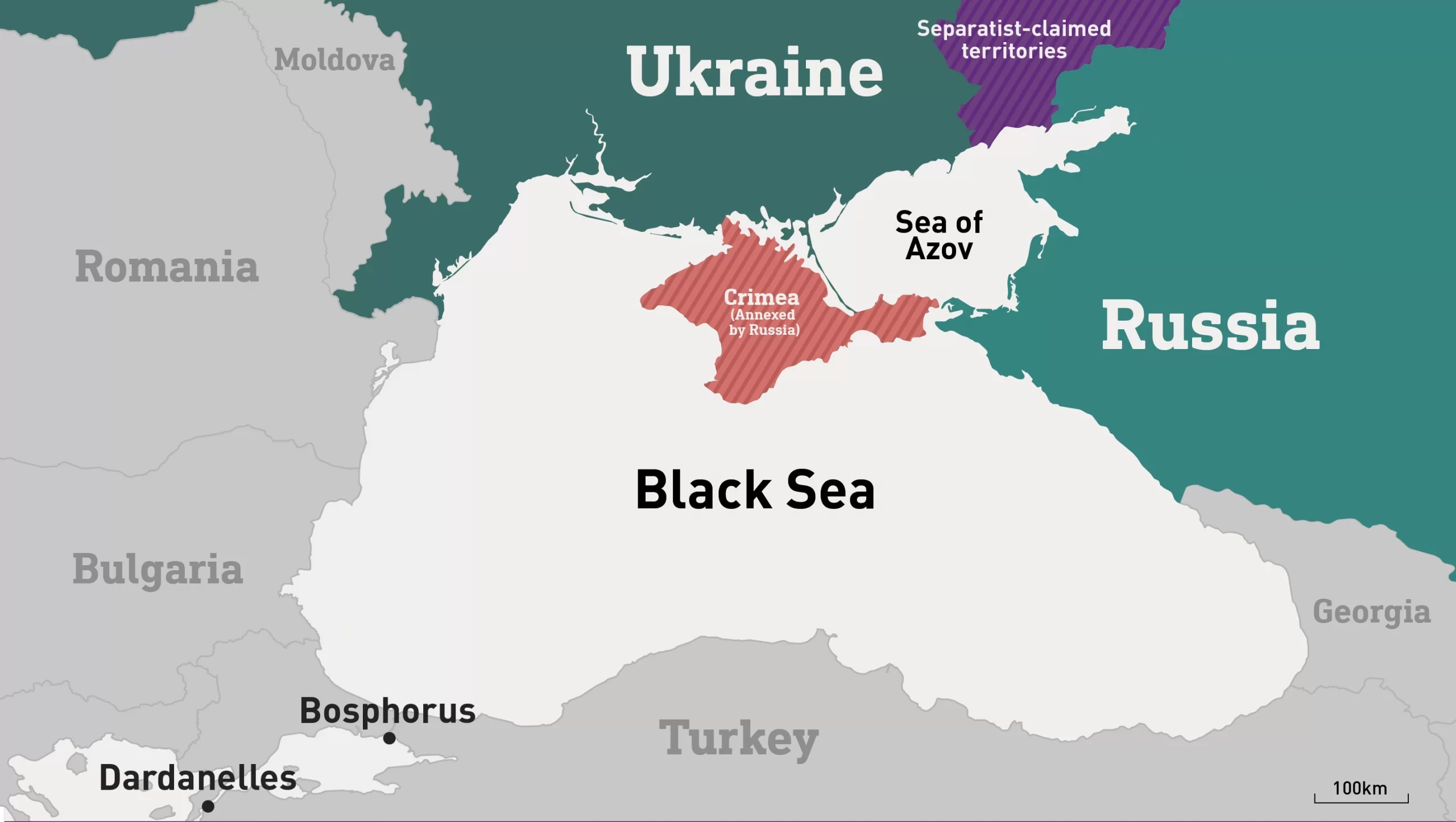The Organization of the Black Sea Economic Cooperation or BSEC is a regional international organization with a focus on multilateral, political, and economic initiatives and collaboration.
It covers territories of Black Sea littoral states, the Balkans, and the Caucasus with an area of about 20,000 kilometers. BSEC represents a region of 335 million people and reaches an intra-BSEC trade volume of $187 billion per year.
It was established in March 1992 in Istanbul and acquired its international legal identity in May 1999. Its 13 members include Albania, Armenia, Azerbaijan, Bulgaria, Georgia, Greece, Moldova, North Macedonia, Romania, Russia, Serbia, Turkey, and Ukraine.
The BSEC is a political and economic initiative that seeks to foster interaction and mutual trust amongst its members.
Structure of BSEC
Summit meetings of the heads of State or governments of member states are held regularly every year. The Council of Ministers of Foreign Affairs is the main decision-making organ of BSEC and meets twice a year.
The Committee of Senior Officials meets 4 times a year and acts on behalf of Ministers of Foreign Affairs. The subsidiary organs formed by the Council of Ministers of Foreign Affairs deal with their mandate defined by the Council to prepare and implement projects.
Working groups and expert groups are subsidiary organs. Chairmanship in office coordinates all activities of the organization (BSEC) and implements decisions adopted by the Council in alphabetical order. One of the members states heads the chairmanship every 6 months.

Black Sea’s significance for Russia
The Black Sea’s significance for Russia can be traced back to 1783 when Catherine the Great fulfilled the Russian quest for warm water ports by annexing Crimea as it was important to Russia being navigable year-round.
During the Cold War, Moscow became the dominant power in the region. Two decades later Russia saw a reversal of its power in the region as Bulgaria and Romania joined NATO.
It however retained control over the Russian Black Sea fleet with agreements with Ukraine. Russia considers the Black Sea essential for projecting its power and as an important trade and transportation artery.
Russia and Central Asian countries
Both Russia and Central Asian countries are highly dependent on the Russian port of Novorossiysk to export grain and oil by ship. Russia is investing in new infrastructure to protect its Black Sea corridor and creating an alternative route to bypass Ukraine.
It is also buttressing its ties with Turkey. The significance of the Black Sea to Russia is
its economic and trade links with European markets, which necessitates multiplying its influence in the Mediterranean and beyond.
Its goals include countering any threat from NATO to the Russian heartland or its strategic bastion in Crimea.
Russia desires to undermine NATO’s cohesion by creating fissures between alliance members along the Black Sea and preventing Ukraine and Georgia from joining the Western Alliance.
Russia sees the Black Sea as an important security buffer zone, aware of the potential for instability to export oil to European markets dependent on Russian oil and gas.
Russia is dependent on the Black Sea for access to the Mediterranean both for military operations and for the export of hydrocarbons. Moreover, Russia is apprehensive of the threats from the Black Sea region, and its proximity to the Russian heartland.
Likewise, it is concerned about the deployment of NATO’s missile defense system in Romania. In response, Russia annexed Crimea in 2014. Moscow justified that it was essential to keep the strategic balance from shifting in NATO’s favor.
This mindset clearly highlights the continued Russian perception of vulnerability. Due to geopolitical reasons, Russia has a disadvantage in the Black Sea.
Although Crimea and the port city of Novorossiysk provide the Russian navy and tankers, with access to warm water ports, all ships leaving or entering the Black Sea must pass through Turkish controlled straits of Bosphorus and Dardanelles.
Ankara‘s control over Bosphorus and Dardanelles was confirmed in the 1936 Montreux Convention. Russian lingering concern is about Turkey‘s ability to use straits as chokeholds during a conflict.

Russia and Turkey
Today Kremlin is engaged in a complex relationship with Turkey. It may be highlighted that Turkey has one of the largest energy markets in Europe.
The significant growth in its economy, population, urbanization, and annual need in the country are envisaged to double in ten years.
Turkey needs to import around 98 percent and 90 percent of its gas and oil supplies respectively. Turkish leaders believe that BSEC serves as a platform for regional cooperation that helps to increase stability, prosperity, and peace in the region.
Thus it attaches great significance to this organization. Ankara wants the organization to have a stronger capability and better efficiency. However, the member states have until now only completed a couple of mandatory deals and common sectoral plans.
Russia and BSEC
There is perceived weakness in the work of BSEC’s institutional structure and its limited financial resources. The International Secretariat has a small number of professionals not given any autonomy.
Moreover, the heterogeneity of member states with regard to their size, economic development, security anxieties, and foreign policy preferences has blurred the identity of the BSEC and the sense of common goals.
Nevertheless, aware of its ineffectiveness and inadequacy Moscow is trying to woo Turkey against the backdrop of its tensions with the US Biden regime.
Moscow‘s overtures towards Turkey include an S400 Air Defense System sale, the construction of a nuclear power plant, and diplomatic support during the 2016 coup attempt against Erdogan.
Turkey remains an unreliable partner for Moscow with a long tradition of adversarial relations and its support to Ukraine and tilts towards NATO.
It may be highlighted that NATO accepts Russia as its prime adversary and calls for a more robust strategy towards Russia, particularly in the Black Sea and South-Eastern Europe.
In addition, despite Russia and the EU having common interests in many spheres, above all in international security and energy sectors and Russian-EU summits, there remains a crisis in the relationship due to the absence of clear strategic goals and mutual trust.
Russia and the EU are both aware of the fact that without each other neither of them can become an independent center of power in international affairs. In spite of this fact, both are taking divergent paths.
The relations nose-dived after the disintegration of the USSR. Thereafter under Putin and his policies as well as Russia’s attempt to reassert itself on the world horizon the relations have worsened.
Furthermore, the EU has also been going through internal crises but has kept its trade and economic relations with Russia intact as a result of pragmatism despite the announcement of sanctions by the Western powers after the invasion of Ukraine.
It may be highlighted that with its 27 members, the EU is however heavily dependent on Russian oil and gas.
About 40 percent of its natural gas, 27 percent of its oil imports, and 46 percent of its coal imports, worth tens of millions of dollars are imported from Russia. So unless alternative sources are found it will keep depending on Russia.
The Diplomatic Insight is a digital and print magazine focusing on diplomacy, defense, and development publishing since 2009.







